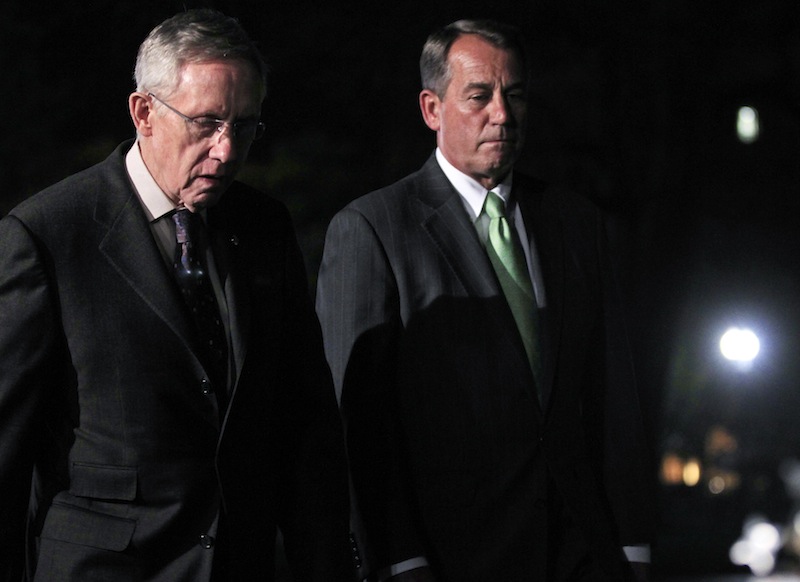UPDATE: 2:20 p.m. ET
Thursday, Oct. 17, is the day that the Treasury Department says it will max out its authority for borrowing money unless Congress raises the debt limit. While the potential for a deal looks promising Wednesday, the procedural hurdles in the Senate mean that a bill might not actually pass until after the debt ceiling is reached.
If that happens, here’s what happens after that, according to Jason Furman, chairman of President Obama’s Council of Economic Advisers.
“If you hit the debt limit on the 17th, the United States will no longer have the authority to borrow,” Furman told a small group of reporters at a briefing last week. “It will have, as Secretary (Jack) Lew said, about $30 billion in cash. Within a very short period of time, that cash would then go away and you’d only be allowed to pay out as much as you collect in.”
To put things in context, the federal government spends somewhere above $10 billion per day on average. But that ebbs and flows. As Lew warned the Senate Finance Committee last week, the Treasury has a series of payments on Medicare, Social Security and other obligations looming in the next two weeks.
“Between Oct. 17 and Nov. 1, we have large payments to Medicare providers, Social Security beneficiaries, and veterans, as well as salaries for active duty members of the military,” Lew said. “A failure to raise the debt limit could put timely payment of all of these at risk.”
So, in the simplest terms, the Treasury Department could probably stave off an actual default for an indeterminate amount of time beyond Oct. 17. Independent analyses have estimated that the federal government could continue to meet its obligations up to Oct. 22 or later with that cash on hand and incoming revenue.
Here’s how the Bipartisan Policy Center broke things down. Treasury owes $12 billion toward Social Security on Oct. 23, $6 billion in debt interest on Oct. 31 and more than $55 billion in major payments on Nov. 1. The department is also expected to “roll over” its debt obligations (i.e. sell new bonds to pay for bonds coming due): $120 billion on Oct. 17 and $93 billion on Oct. 24.
Taking those factors into account, the center projected the government would start defaulting on its obligations between Oct. 22 and Nov. 1.
But there are other uncertainties that complicate the issue. One of the biggest concerns has centered on bond payments and the risk of default on those. Lew explained the problem if bondholders started asking for payouts when the department has no authority to borrow to make them.
“We are relying on investors from all over the world to continue to hold U.S. bonds. Every week, we roll over approximately $100 billion in U.S. bills,” he told the Finance Committee. “If U.S. bond holders decided that they wanted to be repaid rather than continuing to roll over their Treasury investments, we could unexpectedly dissipate our entire cash balance.”
And even if the Treasury then prioritized payments to avoid default on U.S. government bonds, that just means the government would be default on other obligations, Furman told reporters last week.
“This has a massive effect on the economy no matter how you handle the debt limit,” he said. “No matter who you structured it, no matter who you paid, no matter what you paid, no matter what you did, you couldn’t spend more than you collected.”
“We think it’s a default if you’re not paying Social Security, not paying small businesses or not paying veterans. But regardless of what of what words you use, all of these economic effects are pretty much unrelated to what you are or aren’t paying.”
All of that helps explain why most on Capitol Hill agree that approving the increase as soon as possible — preferably on Wednesday — is the best opportunity to avoid any of the above uncertainty.
UPDATE: 2:20 p.m. ET
At his press briefing Wednesday, White House Press Secretary Jay Carney clarified that the debt ceiling would not officially be reached until midnight on Friday.
So it turns out borrowing authority expires midnight TOMORROW night, according to @PressSec
— michael viqueira (@mikeviqueira) October 16, 2013






